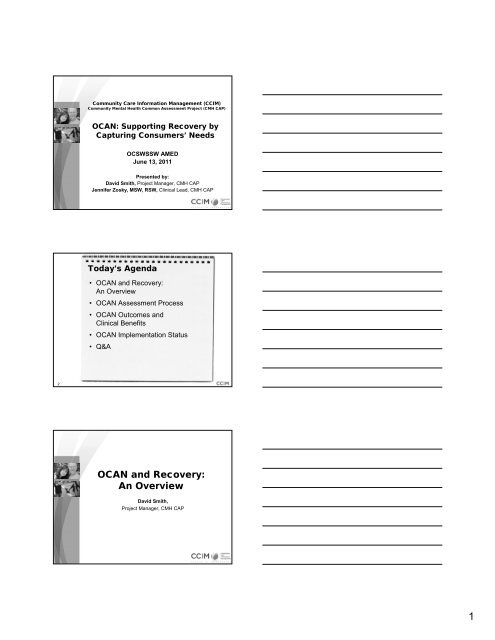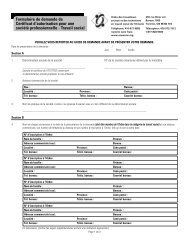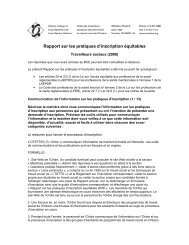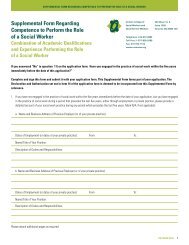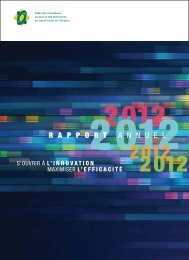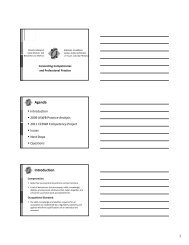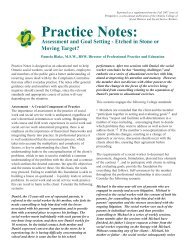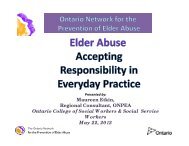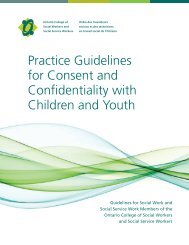David Smith and Jennifer Zosky - Ontario College of Social Workers ...
David Smith and Jennifer Zosky - Ontario College of Social Workers ...
David Smith and Jennifer Zosky - Ontario College of Social Workers ...
Create successful ePaper yourself
Turn your PDF publications into a flip-book with our unique Google optimized e-Paper software.
Community Care Information Management (CCIM)<br />
Community Mental Health Common Assessment Project (CMH CAP)<br />
OCAN: Supporting Recovery by<br />
Capturing Consumers’ Needs<br />
OCSWSSW AMED<br />
June 13, 2011<br />
Presented by:<br />
<strong>David</strong> <strong>Smith</strong>, Project Manager, CMH CAP<br />
<strong>Jennifer</strong> <strong>Zosky</strong>, MSW, RSW, Clinical Lead, CMH CAP<br />
Today’s Agenda<br />
• OCAN <strong>and</strong> Recovery:<br />
An Overview<br />
• OCAN Assessment Process<br />
• OCAN Outcomes <strong>and</strong><br />
Clinical Benefits<br />
• OCAN Implementation Status<br />
• Q&A<br />
2<br />
OCAN <strong>and</strong> Recovery:<br />
An Overview<br />
<strong>David</strong> <strong>Smith</strong>,<br />
Project Manager, CMH CAP<br />
1
Community Care Information Management (CCIM)<br />
Local Health Integration Networks (LHINs)<br />
CCAC CSS CMH&A LTCH CHC SCCH<br />
Assessment<br />
Projects<br />
Common Intake<br />
Assessment<br />
Tool<br />
Long Stay<br />
Assessment<br />
S<strong>of</strong>tware<br />
InterRAI<br />
Community<br />
Health<br />
Assessment<br />
Screener for<br />
the CHA<br />
<strong>Ontario</strong><br />
Common<br />
Assessment<br />
<strong>of</strong> Need<br />
Resident<br />
Assessment<br />
Instrument<br />
MDS 2.0<br />
Integrated Assessment Record<br />
Integrated Data Strategy<br />
Business<br />
Systems<br />
Management<br />
Information<br />
Systems<br />
Human<br />
Resources<br />
Information<br />
Systems<br />
Management<br />
Information<br />
Systems<br />
Human<br />
Resources<br />
Information<br />
Systems<br />
Management<br />
Information<br />
Systems<br />
Human<br />
Resources<br />
Information<br />
Systems<br />
Management<br />
Information<br />
Systems<br />
Management<br />
Information<br />
Systems<br />
Management<br />
Information<br />
Systems<br />
Human<br />
Resources<br />
Information<br />
Systems<br />
Infrastructure & Operations IT Implementation & Support Security, Privacy & Risk Management Transition<br />
Initiation stage<br />
Currently rolling out<br />
Completed <strong>and</strong>/or transitioned<br />
4<br />
CCAC = Community Care Access Centres CSS = Community Support Services CMH&A = Community Mental Health <strong>and</strong> Addictions<br />
LTCH = Long-Term Care Homes SCCH = Small & Complex Continuing Care Hospitals CHC = Community Health Centres<br />
What is OCAN<br />
<strong>Ontario</strong> Common Assessment <strong>of</strong> Need (OCAN) is a st<strong>and</strong>ardized,<br />
consumer-led decision making tool that allows key information to be<br />
electronically gathered in a secure <strong>and</strong> efficient manner.<br />
• Assists client-led decision-making at an individual level<br />
• Identifies individual needs <strong>and</strong> helps match these to existing<br />
services <strong>and</strong> identifies service gaps<br />
• Provides aggregate data to inform organizational, regional <strong>and</strong><br />
provincial level planning <strong>and</strong> decision making that is<br />
consistent with a recovery approach<br />
• Further facilitates inter-agency communication through<br />
common data st<strong>and</strong>ards<br />
5<br />
OCAN Vision<br />
6<br />
2
What is recovery<br />
• A deeply personal, unique process <strong>of</strong> changing<br />
one’s attitudes, values, feelings, goals, skills <strong>and</strong><br />
roles. It is a way <strong>of</strong> living a satisfying, hopeful <strong>and</strong><br />
contributing life even with limitations caused by the<br />
illness.<br />
• Recovery involves the development <strong>of</strong> new meaning<br />
<strong>and</strong> purpose in one’s life as one grows beyond the<br />
catastrophic effects <strong>of</strong> mental illness.<br />
Anthony WA (1993) Recovery from mental illness:<br />
the guiding vision <strong>of</strong> the mental health service system in the 1990s,<br />
Psychosocial Rehabilitation Journal, 16, 11-23.<br />
7<br />
The Bigger Picture:<br />
Canadian Perspective<br />
Goal 1: The hope <strong>of</strong> recovery is available to all<br />
• A person-centred mental health system<br />
• Genuine partnership between consumer <strong>and</strong><br />
service provider<br />
• Hope <strong>and</strong> expectation that people can achieve a<br />
meaningful life in the community<br />
Mental Health Commission <strong>of</strong> Canada (2009)<br />
Toward recovery <strong>and</strong> well-being, Calgary, AB: MHCoC.<br />
8<br />
The Bigger Picture:<br />
<strong>Ontario</strong> Perspective<br />
The system will continue to provide effective,<br />
evidence-informed clinical treatments, such as<br />
psychiatry, psychotherapy <strong>and</strong> drug treatment –<br />
but will do so within a recovery approach to care,<br />
which looks at the whole person <strong>and</strong> defines<br />
individuals positively, focusing on their strengths<br />
<strong>and</strong> goals rather than their illness.<br />
Minister’s Advisory Group (2010): Respect, Recovery, Resilience: Recommendations<br />
for <strong>Ontario</strong>’s Mental Health <strong>and</strong> Addictions Strategy,<br />
<strong>Ontario</strong>: Queen’s Printer for <strong>Ontario</strong>.<br />
9<br />
3
Project Overview <strong>and</strong> Development<br />
2006<br />
2008<br />
2009<br />
2010<br />
2011<br />
2012<br />
Phase 1 – Initiation (with stakeholder representation)<br />
• Analysis <strong>of</strong> many assessments tools<br />
• Selection <strong>of</strong> a core tool – Camberwell Assessment<br />
<strong>of</strong> Need<br />
• Province-wide consultations to introduce the tool<br />
• Formation <strong>of</strong> working groups<br />
Phase 2 – Pilot<br />
• Piloting <strong>of</strong> the automated OCAN in 16 CMH organizations<br />
• Early learnings gatherings<br />
• NE LHIN Implementation pilot<br />
Phase 3 – Implementation<br />
• Provincial roll-out<br />
• Integration with a changing CMH l<strong>and</strong>scape<br />
• Powerful reporting to drive enhanced consumer-centered<br />
service <strong>and</strong> system planning<br />
10<br />
CAN Tool<br />
• Consumer identifies unmet needs/serious problems<br />
• Service provider identifies unmet needs<br />
• Covers a range <strong>of</strong> life domains<br />
• Value <strong>of</strong> both perspectives<br />
• Also identify areas <strong>of</strong> met need<br />
<strong>and</strong> no need - strengths<br />
• Focus on meeting consumer<br />
expressed unmet needs<br />
11<br />
Evidence-based Practice*<br />
Research has demonstrated that…<br />
Converting unmet needs into<br />
met needs improves outcomes<br />
12<br />
* Source: Mike Slade <strong>and</strong> Tom Trauer, Made in <strong>Ontario</strong> conference, March 3, 2009<br />
4
Empirical Conclusions*<br />
• Meeting consumer-identified unmet need improves<br />
outcomes:<br />
• Well-being<br />
• Relationship - Therapeutic alliance<br />
• Satisfaction with services<br />
• Equivalent research into meeting staff-rated unmet need<br />
does not show the same benefits<br />
• Agreement between consumer <strong>and</strong> staff ratings<br />
improves outcome; Agreement increases with more<br />
stable staff-consumer relationships<br />
• Reassessment improves mental health outcomes<br />
13<br />
* Source: Mike Slade, Made in <strong>Ontario</strong> conference <strong>and</strong> The Power <strong>of</strong> Shared<br />
Information conference (2009)<br />
What we’ve heard<br />
OCAN with Consumers<br />
100 consumers surveyed, 73% had been assessed before<br />
Overall satisfaction with OCAN experience<br />
61%<br />
30%<br />
7%<br />
2%<br />
Very<br />
satisfied<br />
Somewhat<br />
satisfied<br />
Neither<br />
Somewhat<br />
dissatisfied<br />
Source: OCAN Evaluation in NE LHIN C/SIs, March 2010<br />
14<br />
What we’ve heard<br />
OCAN with Consumers<br />
• Despite initial uncertainty, consumers have embraced<br />
OCAN’s holistic, recovery approach<br />
Consumer Feedback<br />
(Rated strongly agreed/agreed)<br />
Completing the assessment has:<br />
1. Helped me have a say in my service plan<br />
2. Helped me focus on my goals<br />
The assessment was useful for assessing my needs<br />
My answers are helping my worker underst<strong>and</strong> me better<br />
Original Pilot*<br />
(July 2008)<br />
66%<br />
68%<br />
74%<br />
84%<br />
NE LHIN Pilot**<br />
(March 2010)<br />
65%<br />
65%<br />
79%<br />
74%<br />
15<br />
*Source: Caislyn Evaluation, August 2008<br />
**Source: OCAN Evaluation in NE LHIN C/SIs, March 2010<br />
5
What we’ve heard<br />
OCAN <strong>and</strong> the Sector<br />
• OCAN users realize its value in improving assessment<br />
practice in <strong>Ontario</strong><br />
• The field is supportive <strong>of</strong> OCAN, however there is never<br />
100% consensus<br />
Pilot Coordinator Feedback (from Pilot, February – July, 2008)<br />
Using the assessment helped:<br />
1. Provide staff with an accurate assessment <strong>of</strong> consumers’<br />
needs<br />
2. Identify consumer needs earlier than they might have<br />
using previous processes<br />
3. Identify consumer needs that might not have been<br />
identified normally<br />
Percentage <strong>of</strong><br />
Respondents<br />
81%<br />
56%<br />
56%<br />
Source: Pilot Coordinator Survey, July 2008<br />
16<br />
OCAN Challenges being Addressed<br />
• Need-based rather than strength-based<br />
– Training encourages discussing areas <strong>of</strong> no need or met needs which can be<br />
interpreted as strengths<br />
– Added question on hopes <strong>and</strong> dreams<br />
• One tool – variety <strong>of</strong> services<br />
– Support is provided to all CMH services<br />
– Flexibility in where OCAN fits in assessment process<br />
• Tool terminology takes time to learn<br />
– Have definitions in training <strong>and</strong> communications<br />
• Multiple language environment<br />
– Translation process in place; supports in place to share language versions<br />
• Dem<strong>and</strong> for sharing between service providers as a result <strong>of</strong> the<br />
OCAN common language leads to challenges in underst<strong>and</strong>ing the<br />
privacy <strong>and</strong> security issues associated with sharing information<br />
– Develop <strong>of</strong> CPF, toolkit, info for consumer <strong>and</strong> staff, data sharing agreements<br />
17<br />
Working in Partnership<br />
Information Management Alliance<br />
CMH CAP Steering Committee<br />
Working <strong>and</strong> Reference Groups<br />
Data Elements WG Addictions WG<br />
Technical Decisions RG Reports WG<br />
Diversity RG Dual Diagnosis WG<br />
Business Reqt’s WG<br />
Geriatrics WG<br />
eLearning RG<br />
Cross Sector Advisory<br />
Shared Assessment /<br />
Single Framework WG<br />
Consumer WG<br />
Aboriginal WG<br />
OCAN<br />
LHIN Implementation<br />
Steering Committees<br />
Project Team<br />
Project Management<br />
Clinical Lead<br />
Communications<br />
Consumer Lead<br />
Business Process Education Implementation<br />
18<br />
6
How OCAN Works<br />
<strong>Jennifer</strong> <strong>Zosky</strong>, MSW, RSW<br />
Clinical Lead, CMH CAP<br />
OCAN at a Glance<br />
What<br />
(are your needs)<br />
Who<br />
(are you)<br />
Where<br />
(do you receive<br />
services)<br />
20<br />
Types <strong>of</strong> OCAN 2.0<br />
There are three (3) “types” <strong>of</strong> OCAN:<br />
21<br />
• The CORE OCAN consists <strong>of</strong> the<br />
Consumer Information Summary<br />
<strong>and</strong> the Mental Health Functional<br />
Centre Use<br />
• The CORE + Self OCAN consists <strong>of</strong><br />
the Consumer Information Summary<br />
elements, the Consumer Self-<br />
Assessment <strong>and</strong> the Mental Health<br />
Functional Centre Use<br />
• The Full OCAN consists <strong>of</strong> the<br />
Consumer Information Summary, the<br />
Consumer Self-Assessment, the<br />
Mental Health Functional Centre Use<br />
<strong>and</strong> the Staff Assessment<br />
7
OCAN Assessment Process<br />
22<br />
Consumer Self-Assessment<br />
Rating need<br />
23<br />
Consumer Self-Assessment<br />
24<br />
8
Staff Assessment<br />
25<br />
OCAN Outputs <strong>and</strong><br />
Clinical Benefits<br />
<strong>Jennifer</strong> <strong>Zosky</strong>, MSW, RSW<br />
Clinical Lead, CMH CAP<br />
OCAN Output: Summary <strong>of</strong> Actions<br />
• Actions will be pulled from where they are<br />
entered in the staff automated assessment <strong>and</strong><br />
populated with the corresponding domain<br />
• The consumer <strong>and</strong> staff will determine the<br />
priority for each <strong>of</strong> action<br />
27<br />
9
OCAN Output: Summary <strong>of</strong> Referrals<br />
• Provides staff with a place to consistently<br />
document referrals <strong>and</strong> their status<br />
• Documents service gaps (b/w services available<br />
<strong>and</strong> optimal services) for planning<br />
28<br />
OCAN Output: Reports<br />
2 different types <strong>and</strong> levels:<br />
Individual Reports<br />
• Individual level<br />
• Captures information<br />
relating to a specific,<br />
identified consumer<br />
• Data resides at HSP<br />
organization<br />
• Used by consumers,<br />
managers <strong>and</strong> clinicians to<br />
support individual recovery<br />
St<strong>and</strong>ardized Reports<br />
•System level<br />
• Shows only aggregate<br />
information on unidentified<br />
consumers<br />
• Data collected from each<br />
HSP organization<br />
• Used by HSPs, LHINs <strong>and</strong><br />
MOHLTC for service <strong>and</strong><br />
system planning<br />
29<br />
Reassessment <strong>and</strong> Reporting<br />
OCAN Reassessment is conducted every 6 months.<br />
It is a structured way to:<br />
• Provide consumers with a chance to stop <strong>and</strong><br />
recognize achievements <strong>and</strong> identify next steps<br />
• Provide staff with the opportunity to demonstrate<br />
how they are making a difference over time<br />
• Provide ongoing trending information to support<br />
service <strong>and</strong> system planning<br />
30<br />
10
Individual Reports Sample:<br />
Individual Need Rating Over Time<br />
31<br />
Individual Reports Sample:<br />
Needs Over Time (Consumer <strong>and</strong> Staff)<br />
32<br />
St<strong>and</strong>ardized Reports Sample:<br />
Need Analysis – Consumer View<br />
33<br />
11
St<strong>and</strong>ardized Reports Sample:<br />
Agreement Report – Most Recent<br />
Consumer & Staff OCAN Pairs<br />
34<br />
St<strong>and</strong>ardized Reports Sample:<br />
Change in Unmet Need Over Time –<br />
Consumer Self-Assessment<br />
35<br />
What they’ve done<br />
An Evidence-based Approach<br />
Who<br />
CMHA<br />
Cochrane<br />
New<br />
Liskeard<br />
Centre<br />
OCAN Element<br />
Domain 5:<br />
Daytime<br />
Activities<br />
Domain 15:<br />
Company<br />
Indicator<br />
OCAN reports revealed that<br />
the #1 unmet need is around<br />
company; further confirmed<br />
through OCAN<br />
conversations<br />
OCAN-inspired<br />
Change<br />
Extended centre<br />
hours to include<br />
evenings <strong>and</strong><br />
weekends<br />
Oak Centre<br />
Clubhouse<br />
Domain 15:<br />
Company<br />
Domain 16:<br />
Intimate<br />
Relationships<br />
OCAN reports revealed a<br />
high score for need around<br />
company <strong>and</strong> intimate<br />
relationships; OCAN<br />
conversation confirmed<br />
members that had lost touch<br />
with family <strong>and</strong> friends were<br />
ready to reunite with them<br />
Introduced online<br />
social networking<br />
sites (e.g.,<br />
Facebook) to<br />
members who were<br />
becoming more techsavvy<br />
36<br />
12
Using OCAN Information to Support<br />
Consumers in Recovery<br />
The need information gathered from the self <strong>and</strong><br />
staff OCAN assessments can be used to:<br />
• Improve relationships<br />
• Promote well-being<br />
• Review changes in need over time through<br />
reassessment, which improves mental health<br />
outcomes<br />
• Support social inclusion<br />
• Assist in service <strong>and</strong> system planning<br />
37<br />
OCAN Implementation<br />
Status<br />
<strong>David</strong> <strong>Smith</strong>,<br />
Project Manager, CMH CAP<br />
Where We Are Today<br />
MILESTONE<br />
ESC<br />
SW<br />
WW<br />
HNHB<br />
CW<br />
MH<br />
TC<br />
C<br />
CE<br />
SE<br />
CH<br />
NSM<br />
NE<br />
NW<br />
LHIN ENGAGEMENT<br />
<br />
<br />
<br />
<br />
<br />
<br />
<br />
<br />
<br />
<br />
<br />
<br />
<br />
<br />
INFORMATION SESSION<br />
<br />
<br />
<br />
<br />
<br />
<br />
<br />
<br />
<br />
<br />
<br />
»<br />
<br />
<br />
EXECUTIVE LEAD<br />
FORUM<br />
<br />
<br />
<br />
»<br />
<br />
<br />
<br />
<br />
N/A<br />
<br />
<br />
»<br />
KICK-OFF (%)<br />
55%<br />
»<br />
85%<br />
»<br />
100%<br />
65%<br />
60%<br />
»<br />
83%<br />
75%<br />
36%<br />
85%<br />
»<br />
PRE GO-LIVE<br />
EDUCATION<br />
»<br />
»<br />
<br />
»<br />
<br />
<br />
»<br />
<br />
»<br />
<br />
»<br />
<br />
ASSESSMENT<br />
PROCESS INITIATED<br />
»<br />
»<br />
<br />
»<br />
<br />
»<br />
<br />
»<br />
<br />
<br />
GO-LIVE (%)<br />
»<br />
»<br />
20%<br />
25%<br />
»<br />
58%<br />
17%<br />
36%<br />
15%<br />
POST GO-LIVE<br />
EDUCATION<br />
»<br />
DATA SUBMITTED (%)<br />
17%<br />
38%<br />
15%<br />
IMPLEMENTATION<br />
COMPLETE (%)<br />
39<br />
COMPLETE » IN PROGRESS OCAN/IAR Last updated: June 9, 2011<br />
13
Implementation Approach<br />
Planning<br />
Strategy<br />
Change Management<br />
Strategy<br />
Communications<br />
Strategy<br />
Business Process<br />
Strategy<br />
Technology<br />
Strategy<br />
Education & Training<br />
Strategy<br />
Support<br />
Strategy<br />
40<br />
Implementation Support<br />
41<br />
Regional support<br />
Project education specialists<br />
Implementation leads<br />
Business implementation analysts<br />
Specific help<br />
Subject matter experts in<br />
business process,<br />
technology, clinical issues,<br />
communications, client<br />
leader, privacy <strong>and</strong> security<br />
Training <strong>and</strong> education<br />
Educators to train on a<br />
series <strong>of</strong> education modules<br />
User<br />
Getting prepared<br />
Information sessions <strong>and</strong><br />
kick-<strong>of</strong>f<br />
Getting together<br />
On-site support as<br />
required <strong>and</strong> available<br />
Accessing resources<br />
CCIM Website<br />
Reaching the project<br />
Support Centre<br />
Implementation Team<br />
Staying updated<br />
Regular touch points –<br />
teleconference/WebEx<br />
Questions<br />
42<br />
14
Thank You!<br />
Project Support Centre<br />
Telephone: 1-866-909-5600<br />
Hours: 8:30 – 4:30 weekdays<br />
Email: cmhcap@ccim.on.ca<br />
Website: www.ccim.on.ca<br />
15


